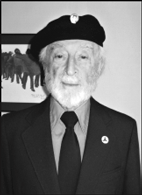By Albert Amateau
The indomitable Moe Fishman, leader of the Veterans of the Abraham Lincoln Brigade, the group of Americans who fought against Franco in the 1936-1939 Spanish Civil War, died Aug. 6 at the age of 92.
He was diagnosed with pancreatic cancer a month ago, according to Georgia Wever, a longtime friend and fellow resident of the Penn South co-op in Chelsea.
Active in progressive causes until the end of his life, Moe Fishman was a leading member of Veterans For Peace New York City Chapter 34, the Joint Antifascist Refugee Committee and United for Peace and Justice.
A limp from a wound he received in 1937 at the Battle of Brunete near Madrid lasted the rest of his life but did not stop him from joining protests over the years. He fought against the House Un-American Activities Committee in the 1950s, U.S. aid to the Nicaraguan Contras in the 1980s and the Navy’s use of Vieques off Puerto Rico as a bombing range until 2003. He marched in protests against the wars in Vietnam, Afghanistan and Iraq.
In August 2004, Moe and a friend carried a Veterans of the Abraham Lincoln Brigade banner in a protest at Madison Square Garden against the 2004 Republican National Convention. He told a reporter for The Villager covering the protest that he was surprised that young people were still aware of the Abraham Lincoln Brigade.
“They read about us on the Internet. They come up — these young girls — they want you to take a picture with them and they kiss you,” he told the reporter with a smile and a twinkle in the eye.
This past spring, Fishman appeared on Pacifica Radio’s “Democracy Now” program, spoke to a high school class on the West Side and shared a podium with Harry Belafonte, according to Peter Carroll, custodian of the Veterans of the Abraham Lincoln Brigade Archives in New York University’s Tamiment Library.
Moses Fishman was born in 1915 in Astoria, Queens, graduated from Stuyvesant High School at the age of 16 and went to work in his father’s laundry business.
He joined a Young Zionists group after another prospective employer told him, “We don’t want any sheenies here,” and later joined the Young Communist League. In an interview with The Villager six years ago, he proudly said he helped organize a large laundry — not his father’s — whose employees got a weekly pay increase from $12 to $14 in their first contract.
When General Francisco Franco’s troops with their Moroccan columns attacked the Spanish Republic in 1936, Fishman tried to sign up with the Loyalists. Rejected at first for lack of military experience — he had never even fired a rifle — he was accepted a second time because of the skill he had learned driving laundry trucks.
He arrived in Spain in February 1937 and trained as an infantry soldier in April. He was injured later that year in his first battle and spent about a year in a Spanish hospital.
He estimated that 60 percent of the Abraham Lincoln Brigade volunteers were in the Young Communist League or the Communist Party.
“The rest were trade union members, Zionists, Socialists — we had Wobblies [Industrial Workers of the World], Trotskyites, Left Democrats. We even had a stockbroker who had made trips to Spain and loved the Spanish people,” he told The Villager.
Outnumbered by Franco, who had German and Italian help, the Spanish Republic saw the writing on the wall in 1938. Fishman recalled the October 1938 speech by “La Passionara,” a charismatic Spanish deputy (“We considered her our mother,” he said) bidding farewell to international volunteers from 57 countries who fought for the Loyalists.
When Fishman returned to New York, he worked in a warehouse of the Joint Antifascist Refugee Committee and became a licensed radio operator. After the U.S. entered World War II, Fishman went into the Merchant Marine as a radio operator.
After the war, he went back to work for the refugee committee and was a leading light in Veterans of the Abraham Lincoln Brigade.
In 1946, the House Un-American Activities Committee branded the Joint Antifascist Refugee Committee and V.A.L.B. as subversive. Subsequently, the U.S. attorney general and the Subversive Activities Control Board put the brigade veterans on a list of proscribed organizations. In 1954, Moe Fishman and Milton Wolff, another brigade veteran, defended the organization, and their appeals led to a court ruling in the 1970s declaring the listing unconstitutional.
Through it all, Moe Fishman kept the V.A.L.B running, produced dozens of issues of The Volunteer, the brigade’s newsletter, rallied support for leftists on trials and was never at a loss for words in public appearances.
In 1986, about 10 years after the death of Franco, several pro-Loyalist groups invited international brigades members to Spain.
“We were treated royally,” Fishman told The Villager. “But in 1996, when we went again, there was a sea change. Thousands of young people, even children of Franco supporters, treated us like heroes, carried our luggage. They wouldn’t even let us lift up a bag.”
A memorial, date to be announced later, for Moe Fishman is being organized by New York University’s Tamiment Library, custodian since 2003 of the Abraham Lincoln Brigade archives.






































